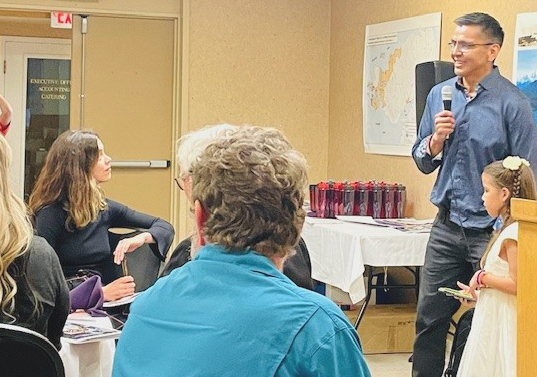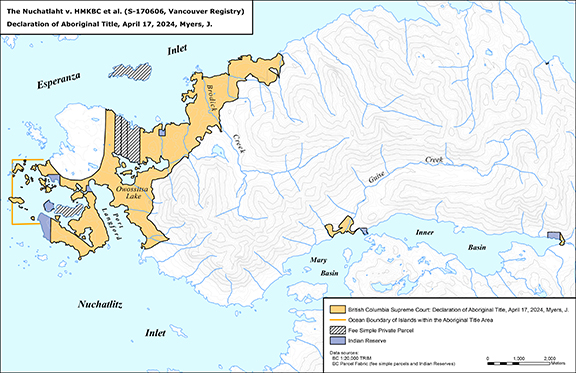Image Caption
Local Journalism Initiative Reporter
Windspeaker.com
After its recent historic legal victory—winning the first-ever trial award of Aboriginal title in the British Columbia Supreme Court—Nuchatlaht First Nation celebrated with a community gathering and feast.
The nation invited community members, supporters and friends for speeches, prayer and a shared meal in Campbell River June 1.

Tyee Ha’wilth Jordan Michael, hereditary head chief, stood with his young daughter at his side as he shared his pride in Nuchatlaht’s determination.
“I remember walking down to the courthouse with my dad in 2017” for the initial filing of the court case “and that was probably one of the proudest moments of my life,” he said.
Tyee Michael explained the sense of victory declared by the courts April 17 was “starting to sink in” as he watched loved ones and supporters fill the room to celebrate. Elders were remembered, children played and conversations bubbled over with appreciation for each other’s dedication and contributions.
The evidence put forward in the courts by Nuchatlaht was bolstered by decades of anthropology work done by John Dewhirst, archaeology by Chelsea Armstrong, who documented the rich agricultural practices of the Nuchatlaht that are still visible today, to efforts by archaeologist Jacob Earnshaw, who found that other archaeologists had been under counting culturally-modified trees in Nuuchatlaht territory by nearly 50 per cent.
Culturally-modified trees have been altered through harvesting efforts, like in the removal of planks or bark for weaving hats and shawls. Scars remain on the tree where it has been used. Only a portion of the tree is taken so it’s kept alive and growing.
Dewhirst’s critical report said ‘Look, judge, somebody had to make those culturally-modified trees and for all of these reasons it had to be the Nuchatlaht,” said lawyer Jack Woodward at the gathering.
The beautiful Nuchatlaht territory of forests, mountains, rivers and coastline also holds a sockeye spawning lake.
“The heart of that has now been (included) to the Aboriginal title, and that is a huge accomplishment,” said Woodward. “I congratulate you for sticking with this to get that. That is unshakeable. That can't be taken away,” said Woodward.
This is what land back looks like, he said. It’s “a peaceful resolution of a land dispute that goes back to the 1800s, so over 150 years of injustice. We're now beginning to reverse that.”
‘Because we believe in who we are’
“Can you imagine a little nation of about 170 people doing what we did? And we did that because we believe in who we are,” said Archie Little, a Nuchatlaht Nation councillor and speaker for the Tyee.
Little shared the story of how this fight began. He had been in Campbell River for a shellfish meeting and noticed Woodward across the hall. Woodward is known for writing the first draft of Section 35 of the Constitution Act in 1982 and for working with the Tŝilhqot’in on that nation’s title rights case. That 25-year legal battle ended in 2014 and was the first Aboriginal title win in Canadian history, though Tŝilhqot’in had to battle to the Supreme Court of Canada for that victory.
“So I went to say hello to him to pay my respects to Jack,” said Little.
“Jack said we Nuchatlaht have the best chance of going to court because of our governance. We've never had elections,” Little explained. “And that's our strength.”
Little went home to talk to his childhood friend, the now late former Tyee Walter Michael Sr. about going to court.
“He said, ‘do it’. And so that's how the process started.”
“After years of frustration with the lack of respect Nuchatlaht received at the treaty negotiating table,” the former Tyee decided to bring the Nuchatlaht fight to the courts, explained a booklet shared at the celebration.
Woodward spoke of the Nuchatlaht being global leaders in their fight for land back. He reminded the audience that Tyee Jordan Michael had spoken two years ago at the World Convention on Climate Change in Glasgow, Scotland. Sharing the message of Nuchatlaht’s battle, he said the nation was “not just a little group fighting a little court case. No, we're fighting for the future of humanity, right?”
Reversing 150 years of injustice
While winning back 2,800 acres is a victory, only a small portion of Hahoulthee (territory) was recognized by courts as coming under Nuchatlaht title control.
“We must still prove the obvious. We must prove that First Nations earned a livelihood from their territory,” wrote the Tyee in a joint letter with Woodward.
From the beaches to the mountaintops, Nuchatlaht were rich with resources, explained Little.

Woodward pointed to the map, and said “This is not everything, these yellow bits. You can expect that we'll go to the Court of Appeal and say, ‘You see that little bit of Aboriginal title there, judges? Nobody had Aboriginal title that was that small…How could a nation survive on an Aboriginal title that small?”
Tyee Michael shared his reaction.
“When I first saw this map, I was pretty upset. A whole bunch of yellow is missing,” he said.
Holding many feelings, he explained, “I’m very happy with the way things are going. It's not what we want. We want the whole territory. But yeah, we're not stopping here. We're going to appeal it, obviously.”
Looking after land and each other
“There's not a day that doesn't go by when I don’t think of… all the people that raised us because we were a community,” said Little. “We looked after each other and we're going to get back to that.”
“To be proactive, to move forward, to do things better and Nuchatlaht would be beautiful again,” Little said. “Some of us are going to move home.”
“And now we're going to think of the future,” said Little. “What are we going to leave our grandchildren? We think of the future generations, so they're proud, so they're wealthy, so they know how to manage their Hahoulthee.”
The principle of hishuk ish tsa’walk (everything is one and all is connected) will guide the work required to restore forests that have been clearcut, repair damaged watersheds, and recover salmon stocks.
Little noted the young people in the audience. “These are my hope,” he said. “I want to thank them for believing.”
“The path being laid is for others to follow,” said Tyee Michael.
Local Journalism Initiative Reporters are supported by a financial contribution made by the Government of Canada.

